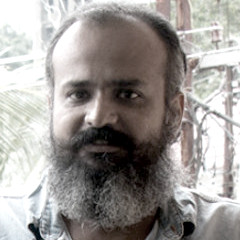‘Kottukkaali’: A bold statement on women's choices in a patriarchal society

Mail This Article
'Koozhangal' director PS Vinothraj's 'Kottukkaali,' starring Anna Ben and Soori, explores a girl's right to choose whom she wants to love. For her family, her fiancé (her maternal cousin), and his family, the girl's choice is viewed as stubbornness, influenced by a spell cast on her by her lover from an oppressed caste. While 'Kottukkaali' predominantly discusses gender politics, it also addresses caste-related issues.
Vinothraj maintains his unique cinematic language, which made 'Koozhangal' endearing and touching, in 'Kottukkaali. However, what stands out is his eye for detail. Unlike contemporaries such as Mari Selvaraj or Vetrimaaran, Vinothraj focuses on the internal conflicts of his characters rather than the external violence to highlight caste and gender issues.
While Anna Ben delivers one of her finest performances as Meena, leaving little doubt that anyone else could have portrayed the character with such impact, the decision to give her a dusky makeover feels out of place in a film that boldly addresses the need for women's agency. If the director envisioned Meena as a dusky girl, he should have cast a dark-skinned actress or had the boldness to present Anna in her natural complexion instead of opting for a makeover without getting dragged into the politics of skin tone.

The silence in which a patriarchal society expects a woman to suffer becomes a source of power for Anna Ben's Meena in 'Kottukkaali.' Her void stare conveys an adamance that echoes, "I will not let them break me." She maintains this mode throughout the film, breaking it on a few occasions that cast doubt on whether anyone else could have portrayed Meena with such conviction. During a journey by the lake, Anna envisions herself strolling freely, the wind softly tousling her hair and a faint smile playing on her lips. For a moment, this vision uplifts her, but reality soon strikes, and one of her eyes wells up. Nevertheless, she musters the strength to withhold her tears and the pain.
A similar moment occurs when she is beaten by Pandi for singing a love song. Following the commotion, Meena climbs into the auto with the same defiance. She gazes outside for a moment that feels like an eternity before checking her reflection in the rear-view mirror. A teardrop hangs, ready to fall in one of her eyes, exposing her pain, but viewing it as a symbol of her failure, she begins to mend her hair with a light smile. This time, however, it's the smile of a victor, one who has made her foe lose his composure. Soori and the others are equally compelling in this scene. The rawness of the moment leaves a lasting impression; it's likely that some actors walked away with bruises from this scene.

In the opening act of the movie, Meena is shown looking compassionately at a rooster tied to the stone inside her home extends beyond mere affection for livestock. The true significance of her gaze becomes more apparent when, by the end, we realise that the rooster symbolises her lover, whom her family believes has enchanted her with a spell. The shaman offers its blood to the deity to ward off this supposed evil. In the rooster, Meena must have seen their shared fate. The oblation could also allude to the honour killings that often result from intercaste relationships in the region.
Vinothraj has embedded the film with satire and situational humour to critique society's hypocritical mindset. Like Ayyappan pointed out in our discussion on 'Kottukkaali' in Padmakumar's cinema podcast 'Start, Action, Cut', when Pandi enquires about his friend's missing father, the friend outrightly abuses his father for choosing an ascetic life cutting all ties with them. This conversation takes place while they are en route to a shaman to 'cure' Meena of the 'illness' of love, highlighting their own contradictory behaviour. Pandi also grows irritated when his friend explains that the road to their clan deity’s worship place remains unpaved because the deity, according to the priests, has warned he would leave if a road is built. On another occasion, Vinothraj holds the shot as the group of men relieve themselves openly by the roadside, lingering until the last drop. The scene captures in vivid detail how the water splashes against different surfaces, evoking laughter at first. However, the humour turns starkly resonant later when we witness the women's struggle to find privacy on the same road, whether to relieve themselves or change sanitary pads. The contrast is striking and hard-hitting.
From the moment the autorickshaw driver has to wind the motor to start it—an act repeated several times—Vinothraj presents countless obstacles before the group, as if the universe is urging them to turn back from a journey that leads towards regressive, almost medieval ways. In the theatrical release, the film concludes with Pandi's hesitance, followed by a reminder from the director: 'The end of this journey is in your hands.' However, this reminder is omitted from the OTT version, making the climax even more open-ended. The reason for Pandi's hesitance is left for viewers to interpret. As a hotheaded chauvinist, witnessing the shaman's process of exorcism, which involves inappropriate touch, may have triggered this hesitation. Having seen the world during his time abroad, Pandi might have recognised the blankness in the girl and woman brought there for healing and never wanted the same for Meena. He may have understood that he lost this battle long ago and that women are not something a man can win.


